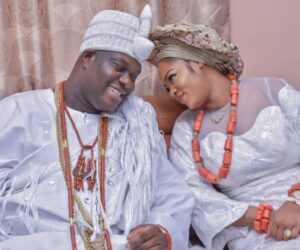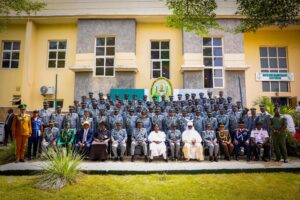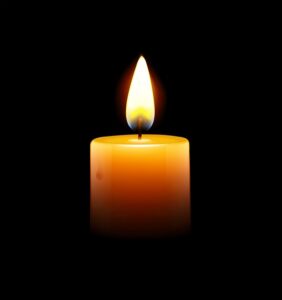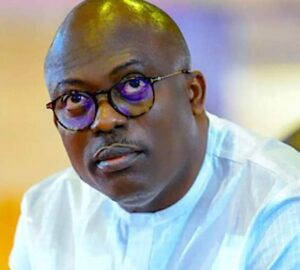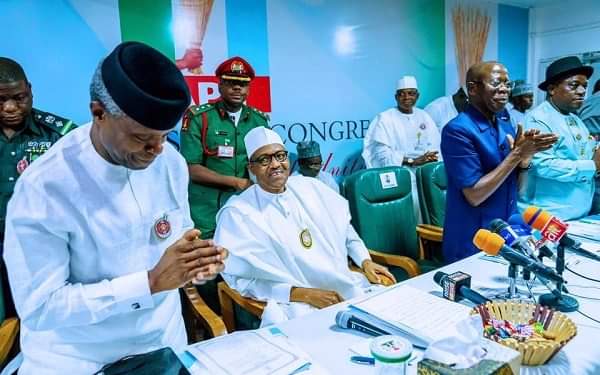
It was the triumph of reason over rascality and impunity. The coup failed. The plotters were dejected. The President called for caution. The chairman survived. But, is the crisis over?
On the eve of the illegal meeting of the All Progressives Congress (APC) National Executive Committee (NEC) summoned by the National Deputy Secretary, the illogicality starred the National Leader, President Muhammadu Buhari, in the face.
The house was threatening to fall. The Commander-in-Chief therefore advised the party warriors to pull the break. He spared thought for the future, momentarily doing away with his peculiar aloofness and indifference.
During his meeting with the divided Progressive Governors’ Forum (PGF), he directed both sides, which claim to be loyal to him, to sheathe their swords and reconcile.
How can there be peace in the government when there is no peace in the ruling party? Only a careless leader will allow his house to collapse on his head when he has an opportunity to carry out some repairs. Observers have alerted the founding fathers of the party to an impending disintegration. President Buhari acted with speed at the eleventh hour, knowing that delay could be dangerous.
The Court of Appeal also came to the rescue of the ruling APC. It ordered a stay of execution of the embarassing order of the lower court suspending Adams Aliyu Oshiomhole as national chairman, pending the determination of the case.
The implication is that the embattled chairman managed to escape the hammer of his detractors. Yet, he can hardly sleep with his two eyes open. It is a game of ambition for power. Definitely, his foes, now on the defensive as from yesterday, will not return to their shell quietly. They will return to the drawing board to restrategise. Both camps are gazing at the fast approaching governorship elections in Edo and Ondo. They will be locked in a battle of wits, scheming, stiff competition and antagonism.
Had reason not prevailed, APC would have boxed itself into disaster. The cancelled meeting would have led to chaos. Gladiators would have converged in error to sustain their onslaught and hatch the plot to remove Oshiomhole through illegal means. The anti-Oshiomhole forces would have jubilated like the Edo APC faction which hailed the judicial suspension.
But, the chairman’s removal would have aggravated the protracted crisis.
There is no consensus on whether Oshiomhole should go or stay. There would have been a clash of ego, tactics and propaganda.
Consequently, the party would have been divided down the line. The NEC would have split and the parallel NECs would be working at cross purpose. Oshiomhole commands the loyalty of more than half of NEC members.
Also, the National Working Committee (NWC) would have become polarised. Many state chairmen have started perceiving the plot to shove Oshiomhole aside as an affront. They enlisted in the battle for survival, hence, their resistance.
The division in the APC governors’ forum would have escalated. Oshiomhole has supporters and antagonists among members of the forum. So, far, there is no neutral governor.
The government of Buhari would have also become divided. Team spirit would have been destroyed. Already, there is division in the National Assembly over the leadership crisis. The party would have been worse for it.
Also, reconciliation would have become more difficult. If the coup had succeeded, it would have erected fresh hurdles on the way of the Akande panel. The logjam would have thrown up more challenges that would have taxed the party’s crisis resolution mechanism to the brim.
Remarkably, elder statesman Akande had cried out that it was improper for aggrieved chieftains to head for court without first exhausting the avenues for crisis resolution.
The journey into this perilous moment began last year. The politics of governorship nominations created a gap between outgoing governors and the party chairman, who insisted on internal democracy, equity, fairness and justice. Since the governors lost their bid to hand over to their anointed candidates, they blamed Oshiomhole, who they collectively described as a governor who had his way in Edo only to create obstacles that thwarted their succession agenda.
Oshiomhole also came under attack for his management styles. He was accused of not promoting consultation and inclusion. The chairman was said to have refused to carry members of NEC along, preferring to run a one-man show. Meeting venues were shifted from the national secretariat of the party to his private residence in Abuja. He was too combative and arrogant.
But, during the elections, Oshiomhole was a delight on the field. He justified the confidence reposed in him, leading the party to victory in presidential, governorship and parliamentary elections. The only concern was that he did not succeed in pacifying or dissuading aggrieved chieftains who later indulged in anti-party activities by contesting or sponsoring candidates against their party during the elections. At the home front, the party lost is cohesion and peace. Edo chapter was boiling. Oshiomhole was inundated with complaints against Governor Godwin Obaseki by chieftains. His intervention led to enmity between him and his successor. Both camps had to engage in a war of attrition in the House of Assembly. In fact, Edo House of Assembly is still at half as 14 members have not been inaugurated, following their rejection of proclamation at midnight.
The second term ambition of the governor became a bone of contention. To survive, Obaseki, who had threatened to probe Oshiomhole, teamed up with forces that plotted his downfall.
The ward of the chairman was instigated to suspend him. Earlier, moves to draw the curtains on his tenure as chairman were resisted by governors Babagana Zulum of Borno State and his Osun counterpart, Gboyega Oyetola in Abuja. Before then, Senator Kabiru Marafa had cried out that some governors were working with aggrieved NEC members to sack Oshiomhole. He alleged that they were rooting for former Zamfara State Governor Abdulaziz Yari as replacement.
Oshionhole also committed a blunder. Although the affected zones had selected capable and suitable chieftains for the vacant positions of National Deputy Chairman (South), National Secretary and Treasurer, he hesitated to make the announcement after the ratification of the appointments. The announcement only became more compelling after his foes obtained a court order that suspended him from office.
To observers, the crisis in the APC escalated as permutations for 2023 begun three years to next elections. The chairman is perceived as an obstacle to his detractors’ 2023 calculations.
This perception drew the ire of Asiwaju Bola Tinubu, who berated them for a shortfall in wisdom and understanding of the limitation to seasonal politicking for the purpose of advancing governance, which is perpetual. He said they were assailed by the old Ambition-virus 2023.
However, the move to send Oshiomhole packing was hectic, until the national deputy chairman usurped the powers of the chairman, posing as acting chairman and improperly sending out notice for an imaginary NEC meeting. The police sealed up the party office, prevented some officers from gaining access while allowing others.
To deck the act of perfidy in the garb of legality, a questionable regional endorsement was hurried packaged in Benin city, attended by paper-weight actors who fired salvos at the chairman.
Tension seized the party as the coup plotters begun mobilisation for a meeting that will not hold.
The lessons of the imbroglio should not be lost on the divided political family. Party cohesion and unity are non-negotiable. Therefore, political conflicts and intra-party squabbles should be moderated. In the absence of restraints, the ruling party will play into the hand of the opposition.
The embattled chairman may have been rescued temporarily. The onus is on him to realistically reassess himself and adjust the styles that have cast him in the mould of a rigid, highhanded and dictatorial party leader. He should shun vendetta and become more conciliatory and condescending, but without compromising cherished principles that serve as foundations of great character and integrity.
Oshiomhole’s friends-turned enemies should also propose options that will restore mutual confidence. Both sides may have to give concessions, build consensus, strive at an accord and work for concord.
More crises are anticipated as the party prepares for governorship primaries in Ondo and Edo.
There is much work for the Akande Reconciliation Committee to do, not only at the national level, but also at the crisis-ridden chapters.
Oshiomhole supporters and the camp that is opposed to him will now brace up for the challenge of litigations in courts, especially if they resolve to resume hostilities.
Will Oshiomhole gain more grounds? Will he wave the olive branch? Will those opposed to his leadership let the sleeping dog lie? Will the two camps wait till the mid-term convention to test their strengths? Will peace return to APC?
By Emmanuel Oladesu






